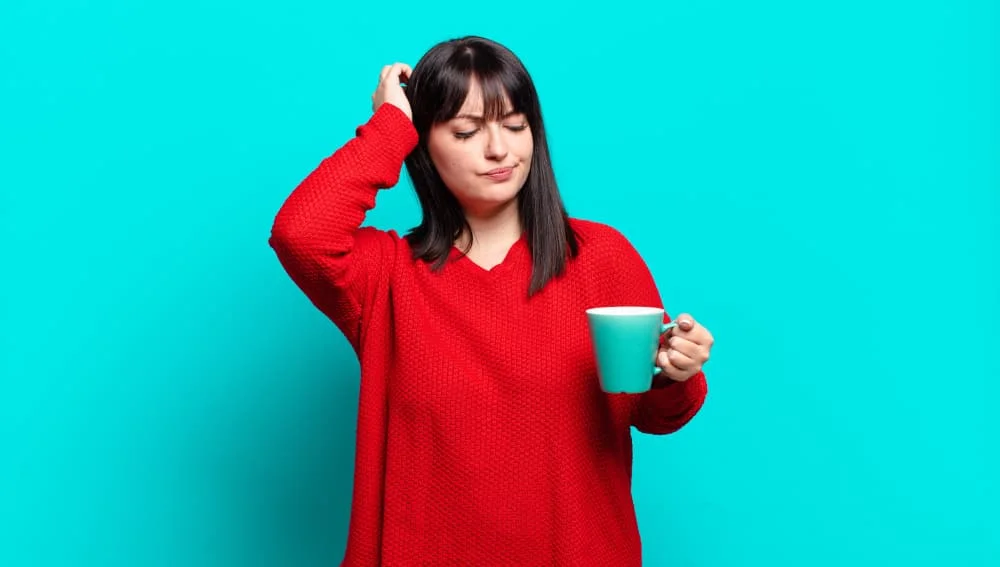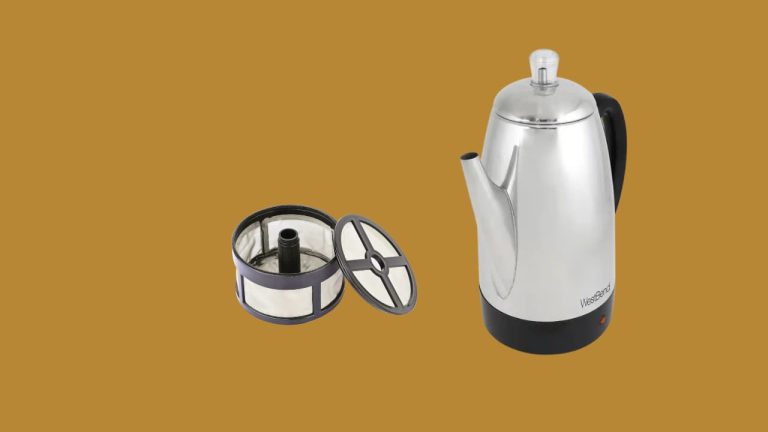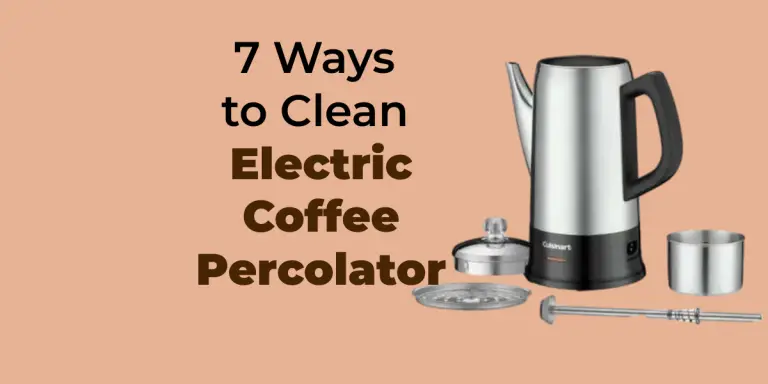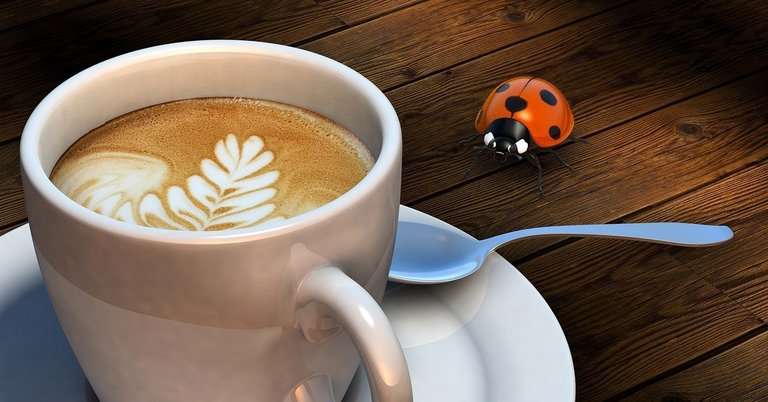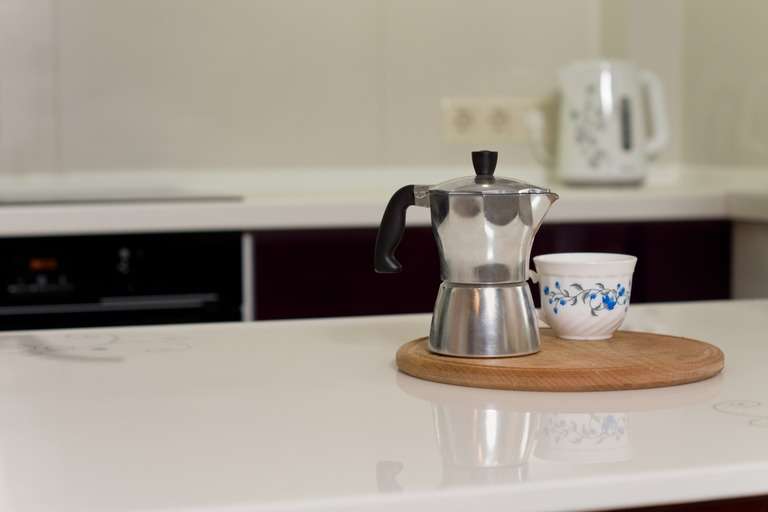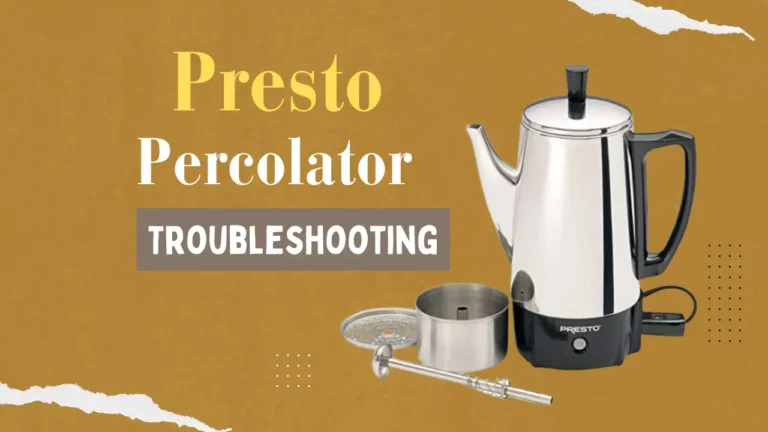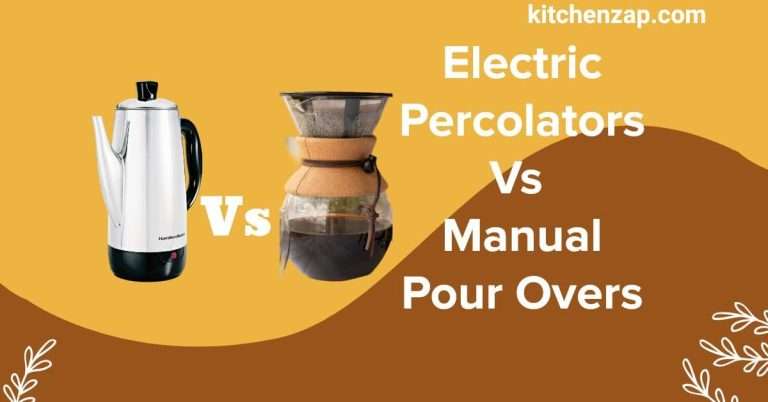Why Your Percolator Makes Weak Coffee and What to Do About It: 10 Easy Steps
Why Your Percolator Makes Weak Coffee?
Your percolator produces weak coffee for several key reasons:
- Inadequate coffee-to-water ratio – Most percolators need a higher coffee-to-water ratio for full-flavored extraction. Too much water dilutes the coffee during percolation.
- Improper grind size – If the grind is too coarse, the water flows too quickly through the coffee bed, leading to under-extraction. Conversely, too fine a grind can cause over-extraction and bitterness.
- Low brewing temperature – Percolators often do not heat water hot enough for optimal extraction. Colder water fails to properly extract flavors and oils.
- Short contact time – Rapid percolation provides too little contact between hot water and coffee grounds. More time is needed for complete extraction.
Adjusting these key parameters will help produce a more intense, flavorful brew from your percolator rather than a weak, lackluster cup.
Key Takeaways:
- Use an optimal coffee-to-water ratio suited to your percolator – often 1-2 tbsp grounds per 6 oz water
- Choose a fine grind size for full flavor extraction during percolation
- Allow adequate brew time of at least 7-9 minutes for complete saturation
- Precisely heat water to 200-205°F before brewing
- Don’t overfill the percolator chamber
- Use fresh, high-quality coffee beans and store properly
- Clean the percolator thoroughly after each use
- Consider replacing old or improperly designed percolators
- Experiment to find the right parameters for your preferred taste
Whether your electric percolator or stovetop model fails to extract a potent cup, this guide has you covered. Follow our percolator troubleshooting tips to finally fix weak coffee from your percolator.
Discover what’s inhibiting full flavor from your percolator. Let’s optimize your technique for coffee strength.
- Please refer to user guide or user manual or user guide (provided below in PDF) before first use
- ☕ ENJOY IRRESISTIBLE TASTE & AROMA – You deserve the best so ditch the rest – our Percolator has been designed to…
1. Percolator Coffee to Water Ratio
Are you using the right amount of coffee grounds for the water? An off ratio can give you weak, watery coffee.
Don’t worry – you can fix this! Start by adjusting the coffee-to-water ratio. A good starting point is 1-2 tablespoons of grounds per 6 ounces of water.
You may need to tweak the ratio depending on your taste and percolator model. The ideal ratio often falls between 1:15 to 1:12.
Here are some tips to Percolator coffee ratios for you
- Use measuring spoons and cups for accuracy.
- Begin with a 1:15 ratio of 1 tablespoon per 6 oz of water.
- Brew a pot and adjust from there to find your ideal strength.
- Make notes once you’ve found the perfect measurements.
In summary, carefully measuring and experimenting with the coffee-to-water ratio is crucial for getting the right strength.
Adjust the amount of grounds per water until you find the ratio that gives you a robust, flavorful brew. Taking precise measurements is key for consistency.
2. Coffee Ground Size Optimization for Strong Percolated Coffee
If you still have weak coffee after fixing the coffee-to-water ratio, take a look at your grind size.
Coarse grinds don’t extract well in percolators. The water passes through too quickly without absorbing all the oils and flavors.
Use a finer grind, similar to granulated sugar. This allows better extraction for full-bodied flavor.
Dialing in the right grind size takes experimentation. Adjust from coarse to fine and test the results.
Finding the perfect grind to match your preferred strength may take some trial and error. But it’s worth it.
In summary, grind size makes a big difference in percolator coffee. Coarse grinds lead to weak coffee.
A finer texture allows the water to extract more oils and dissolve the grounds fully. Take the time to experiment with grind size for strong flavor.
Optimizing Coffee Ground Size
- Use a burr grinder on a fine setting meant for espresso or turkish coffee.
- Compare grind size to common kitchen items like sugar or salt for a visual reference.
- Start with turkish fine and gradually go coarser until you find the optimal size.
3. Allowing Proper Percolator Brew Time
Brew time is especially important in percolators to allow for full extraction. The continuous cycling of water requires enough contact time.
Aim for a full 7-9 minutes of percolation for robust flavor. The grounds need time to fully saturate and dissolve.
If your percolator coffee is still weak, extend the brewing time to 10+ minutes. Use a timer to precisely track the cycle.
Don’t disrupt the flow by lifting the percolator’s lid during brewing. This can prevent proper saturation.
With adequate brew time, the water will extract maximum oils and dissolve the grounds completely.
In short, don’t cut the brew time short. Stick to at least 7-9 minutes for extraction given the percolation process.
Increase the time if you need even stronger coffee. A little patience goes a long way for flavorful percolator coffee.
4. Heating Water to the Right Temperature for Percolators
Low water temperature is especially detrimental in percolators. The continuous recirculation requires hotter water for extraction.
Aim for 200-205°F water in a percolator. Temperatures below 195°F risk weak, under-extracted coffee.
Bring water to a rapid boil on the stove or in an electric kettle. Use a thermometer to hit the target temp.
Pour the boiling water into the percolator immediately before it drops below 205°F. Don’t let it cool first.
With water heated to the ideal temperature range, the percolator can properly extract oils and dissolve the grounds for robust flavor.
In summary, precisely heated water is crucial in percolators. Shoot for 200-205°F and pour immediately once heated to maximize extraction power. The right temperature prevents weak, watery percolator coffee.
- BREW GREAT-TASTING COFFEE: The percolator automatically brews rich, flavorful coffee that makes for a perfect morning….
- Premium Quality Coffee Percolator: Classic electric percolator brews from 2 to 10 cups of great-tasting coffee, hot,…
5. Don’t Overfill Your Percolator
Overfilling can lead to major issues in percolators. Too much coffee and water prevents proper water circulation.
Check your percolator’s manual for the max fill capacity. As a general rule, use 1 tbsp grounds per 6 oz water.
Leave at least 2-3 inches of headroom in the percolator chamber. Overflow can damage the pump.
Too much water won’t properly cycle and extract flavor from the grounds, resulting in weak coffee.
Carefully measure out ingredients. Precision filling allows optimal percolation flow and saturation.
In summary, resist the urge to max out your percolator’s capacity. Overfilling impedes water circulation critical to percolation. Follow fill instructions to allow water to properly extract flavor for strong coffee.
6. Use Fresh Coffee for Strong Percolator Brews
Old, stale coffee beans won’t cut it for percolators. The continuous recirculation requires fresh, robust beans.
Look for beans roasted within the past 1-2 weeks before brewing in a percolator. Check for recent roast dates.
Store beans in an airtight container out of sunlight and heat which accelerate staleness.
Consider grinding beans right before percolating. Fresh grinds have more oils for the water to extract.
High-quality, super fresh beans contain more flavor compounds. This prevents weak percolator coffee.
In short, freshness is key for percolator coffee. Stale beans and grounds lead to underwhelming flavor. Look for recently roasted beans and grind them same-day for the strongest cup from your percolator.
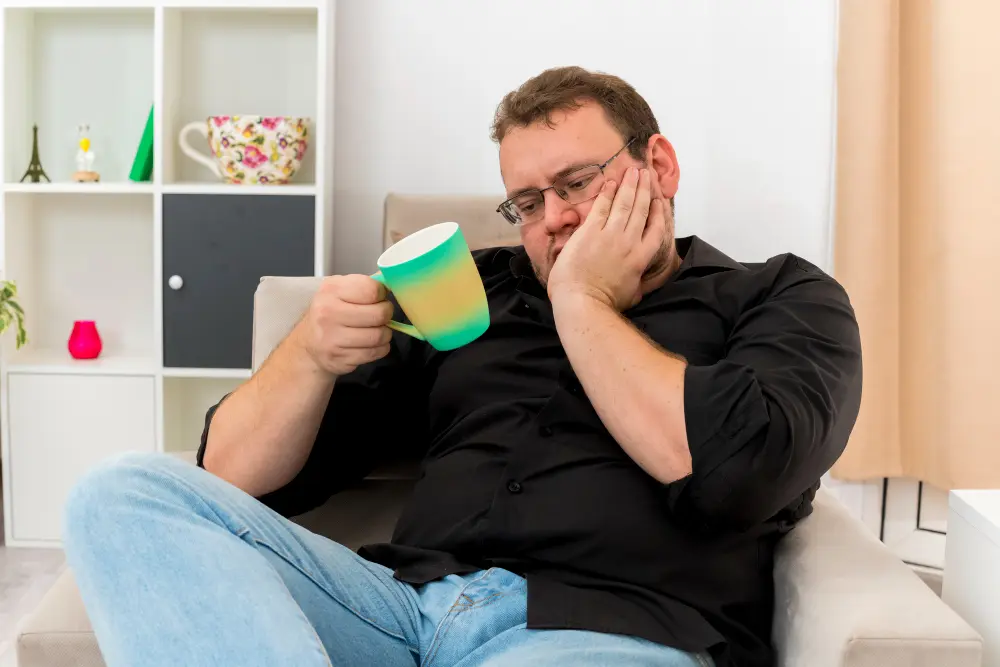
7. Don’t Neglect Percolator Cleaning
Allowing residue buildup spells disaster for percolators. Mineral deposits clog the internal tubing and pumping system.
Clean your percolator thoroughly after each use. Remove grounds and rinse with hot water immediately.
Use a non-abrasive brush to scrub all interior parts, especially the percolator tubing and basket.
Brewing an equal mixture of water and distilled white vinegar dissolves stubborn buildup.
Always rinse several times after cleaning your percolator. Residual vinegar ruins coffee’s flavor.
In short, frequent, thorough cleaning is crucial for percolators. Allowing any residue or scaling impairs the percolation process and leads to weak coffee. Keep things clean for optimal performance.
8. Replace Old Percolators That Lose Brewing Power
Percolators contain many small parts that degrade over time. This causes uneven water heating and flow leading to weak coffee.
Consider investing in a new stainless steel percolator for reliably robust coffee. Read reviews to choose quality models.
You can also have your old percolator professionally serviced. Explain issues like weak brewing, longer perk times, etc.
A technician can identify and replace any tubing, gaskets, or parts causing poor percolation function.
While a new percolator has some upfront cost, it ensures strong coffee for years to come thanks to durable materials.
In summary, if your old percolator produces weak coffee no matter what you try, it may be time to replace it. Servicing or upgrading to a new model can restore strong percolating function. Don’t settle for lackluster coffee.

9. Choose Beans Suited to Percolation
Low-quality beans won’t properly extract in a percolator resulting in weak coffee. Select beans suited to the process.
Look for medium or dark roasts that stand up well to prolonged heat and water contact.
Check for a roast date within the past 10-14 days. Recently roasted beans have more oils to extract.
Flavor notes like chocolate, nuts, and dried fruit hold their own during percolation. Delicate beans can become over-extracted.
Try both single-origin and blended beans to find types that shine through percolation’s robust extraction.
Experimentation and tasting different beans helps discover the best match for your percolator.
In short, higher-quality, oilier beans specially selected for percolation deliver the strongest flavor. Make sure your beans are fresh and suited to the long brew time and heat.
10. Select a Percolator Designed for Robust Brewing
Some percolators simply aren’t engineered to produce strong coffee. Opt for one made for intense extraction.
Look for large baskets, long perk times, and durable stainless steel construction optimized for bold coffee.
Top picks are the Farberware Classic 8-cup and the Presto 6-cup percolators which extract flavorfully.
Avoid plastic percolators which can impair temperature stability required for strong extraction.
Pay attention to details like the wattage, tubing, and pumping system when choosing your percolator.
In summary, the right equipment matters. Choose a percolator designed specifically for robust coffee to avoid weak, lackluster brews. Do your research to select a model that other users rate as making intense coffee.
Weak Percolator Coffee Troubleshooting Checklist
Use this checklist to diagnose what could be causing weak coffee from your percolator:
- Coffee-to-water ratio – Are you using the recommended ratio for your percolator model? Generally 1-2 tbsp grounds per 6 oz water.
- Grind size – Is your grind a fine texture like granulated sugar? Coarse grinds lead to weak coffee.
- Brew time – Are you brewing for at least 7-9 minutes? Proper time is key for extraction.
- Water temperature – Is your water heated to 200-205°F before brewing? Cool water causes weak coffee.
- Overfilling – Is there adequate room for water circulation in the percolator chamber?
- Fresh beans – Are you using beans roasted within the past 2 weeks? Stale beans lack flavor.
- Cleaning – Are you cleaning the percolator thoroughly after each use? Buildup impairs function.
- Equipment – Is your percolator old or not designed for strong coffee? May need replacing.
- Bean quality – Are you using high-quality beans suited to percolation like medium roasts?
Going through this checklist will help you get to the bottom of any weak coffee issues from your percolator. Follow our troubleshooting tips to get a robust brew
FAQs
1, Why is my percolator making weak coffee?
There are several reasons why your percolator might produce weak coffee. Some possible causes include an incorrect coffee-to-water ratio, using coarse coffee grounds, insufficient brewing time, water temperature not being hot enough, overfilling the percolator, using low-quality coffee beans, a dirty percolator, or an old and damaged percolator.
2, Does percolator coffee taste better?
The taste of percolator coffee can vary from person to person. However, many people enjoy the unique flavor of percolated coffee, which is often described as rich and full-bodied. The percolator brewing method allows water to pass repeatedly through the coffee grounds, extracting a greater amount of oils and flavors, which can contribute to a more intense taste.
3. How can I make percolator coffee taste better?
Here are some tips to improve the taste of your percolator coffee:
– Use fresh and freshly ground coffee beans. The freshness of the beans affects the final flavor of the coffee.
– Opt for a finer grind of coffee for percolation. Finer grounds allow for easier extraction of flavors.
– Ensure an adequate brewing time. A longer brewing time allows the coffee to develop a more intense taste.
– Use the correct coffee-to-water ratio. Follow the instructions provided with your percolator to achieve the ideal proportion.
4. Can I use instant coffee with my percolator?
It is not recommended to use instant coffee with a percolator. Instant coffee is soluble and does not require a brewing method like the percolator. Additionally, instant coffee may not provide the same rich flavor and aroma that can be achieved with freshly ground coffee beans.
5. How long does it take to make coffee with a percolator?
The preparation time for coffee with a percolator can vary depending on the specific percolator. However, in general, the percolation process takes about 7 to 10 minutes to produce a deliciously aromatic cup of coffee.
Conclusion
At this point, you should have a solid grasp on why your percolator makes weak coffee and how to fix it for a strong brew.
By identifying the issues causing weak percolated coffee and making the necessary adjustments, you can finally achieve the robust flavor you crave. Persevere through the dialing-in process and enjoy intense cups of joe from your percolator.

